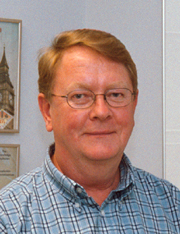Featured Story
 | Arne Ohlsson Researcher Toronto, Ontario |
How did you first become involved with The Cochrane Collaboration and the Canadian Cochrane Centre (formerly the Canadian Cochrane Centre and Network)?
In the fall of 1987, I was enrolled in the Master of Science program at McMaster University. That year I took a course in systematic reviews when it was first being taught by Dr Andy Oxman. The teachers and observers present were important Cochrane people to be, such as Iain Chalmers, Murray Enkin, Marc Keirse, and methodologists such as Tom Chalmers and Gord Guyatt. The course work I completed during this time was “Treatments for preterm premature rupture of membranes: A meta-analysis.” This work was later published as one of the first perinatal systematic reviews (meta-analyses) published in a peer-reviewed journal in the American Journal of Obstetrics and Gynecology 1989;160:890-906; cited 111 times (according to Web of Science, latest citation in 2013). It was included as part of a book chapter - “Prelabour rupture of the membranes preterm” - in the book “Effective care in pregnancy and childbirth” (Eds Chalmers I, Enkin M, Keirse MJNC). Oxford University Press, Oxford 1989. It was my involvement with these core future Cochrane leaders in 1987 that led me to become involved with the Collaboration when it was later established.
In the 1990s I was teaching systematic reviews in Denmark and Sweden with Andy Oxman and Peter Gøtzsche. In 1999 I developed a course in Systematic Reviews of Randomized Controlled Trials Cochrane Reviews for the Program in Clinical Epidemiology, at the University of Toronto, and in 2000 it was accepted as a regular course. The course was very popular and resulted in a number of systematic reviews published within and outside of Cochrane.
What inspires you most about Cochrane?
I’m inspired by Cochrane because it is a not-for-profit organization, with collaborators from over 120 countries. We work together to produce credible, accessible health information and we engage the public in the conduct of our reviews. Our reviews are regularly updated, and we have excellent international co-operation. We are not industry funded, we work to avoid bias, and we are accessible with user-friendly software. There is so much to be proud of, regarding what the Collaboration and the Canadian Cochrane Network and Centre (now Cochrane Canada) has accomplished.
Who did you look up to as a doctor when first starting with Cochrane?
My course supervisors, professors and leaders that I encountered at the Master of Science Program at McMaster had the greatest influences on me. People like Iain Chalmers, Murray Enkin, Mark Keirse, Andy Oxman, Brian Haynes and Jack Sinclair.
How has Cochrane changed since you’ve been here?
I think everyone will agree that the biggest change is how funding is secured. When I became the Director [of the Canadian Cochrane Centre] in 1998, funding was never a guarantee and it was always a struggle to try to get people to understand the importance of the Centre and the Network, and receive constant, secure funding. In recent years, funding has been much more secure and long term, which allows the Centre to operate at full capacity with greater efficiency.
What is your biggest achievement at Cochrane Canada?
I was the Director of the Cochrane Network and Centre from November 1998 to January 2005, taking over from Dr Brian Haynes. With Kathi Clarke, my Co-Director, we worked hard to engage collaborators at the Cochrane sites across Canada from Newfoundland to British Columbia and we ran a Cochrane systematic review course across the country. Together, with Kathi Clarke, we organized the 2004 Cochrane Colloquium in Ottawa in October 2004. The Colloquium was a great success and was attended by more than 900 delegates from around the world.
I am the first or co-author of 37 Cochrane reviews, and almost all have been regularly updated. Two of these reviews are ranked as number three and four in the “Top 10 Reviews” for full-text downloads from The Cochrane Library Neonatal Reviews. Another three of my reviews are among the top 25 most downloaded reviews in the Cochrane Neonatal Review Group.
I was very pleased that when I stepped down as the Director of the Canadian Cochrane and Network Centre Dr Jeremy Grimshaw was appointed as the new Director and he has done an amazing job over the last almost 10 years.
What are your plans for the future?
I retired from clinical work in 2008; however, since 2011, I am one of the Co-Editors of the Cochrane Neonatal Review Group, the second largest review group after the Pregnancy and Childbirth Review Group. I hope to be able to continue in that role for a while and to continue to update Cochrane Reviews, which is a never ending challenge.




